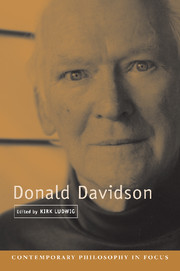Book contents
- Frontmatter
- Contents
- List of Contributors
- Introduction
- 1 Truth and Meaning
- 2 Philosophy of Action
- 3 Radical Interpretation
- 4 Philosophy of Mind and Psychology
- 5 Semantics and Metaphysics of Events
- 6 Knowledge of Self, Others, and World
- 7 Language and Literature
- Bibliography of Davidson's Publications
- Selected Commentary on Davidson
- Bibliographic References
- Name Index
- Subject Index
6 - Knowledge of Self, Others, and World
Published online by Cambridge University Press: 02 December 2009
- Frontmatter
- Contents
- List of Contributors
- Introduction
- 1 Truth and Meaning
- 2 Philosophy of Action
- 3 Radical Interpretation
- 4 Philosophy of Mind and Psychology
- 5 Semantics and Metaphysics of Events
- 6 Knowledge of Self, Others, and World
- 7 Language and Literature
- Bibliography of Davidson's Publications
- Selected Commentary on Davidson
- Bibliographic References
- Name Index
- Subject Index
Summary
Davidson's epistemology, like Kant's, features a transcendental argument as its centerpiece. Both philosophers reject any priority, whether epistemological or conceptual, of the subjective over the objective, attempting thus to solve the problem of the external world. For Davidson, three varieties of knowledge are coordinate – knowledge of the self, of other minds, and of the external world. None has priority. Despite the epistemologically coordinate status of the mind and the world, however, the content of the mind can be shown to entail how things are out in the world. More exactly, Davidson argues, we could not possibly have the beliefs we have, with their contents, unless the world around us were pretty much the way we take it to be, at least in its general outline. We are thus offered a way to argue, to all appearances a priori, from how it is in our minds to how things are in the world. The argument is a priori at least in being free of premises or assumptions about contingent particularities concerning the world around us or our relation to it. From premises about the contents of our propositional attitudes, the argument wends its way to a conclusion about the general lines of how the world around us is structured and populated.
Before presenting his own account, Davidson rejects received views of meaning and knowledge. What follows will combine themes from his critique of alternatives with his more positive account and its way of dealing with the skeptic.
- Type
- Chapter
- Information
- Donald Davidson , pp. 163 - 182Publisher: Cambridge University PressPrint publication year: 2003
- 5
- Cited by



